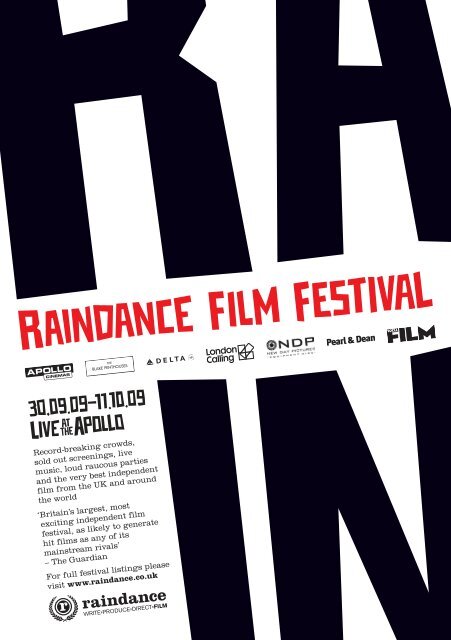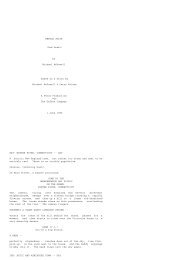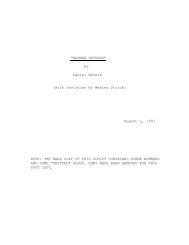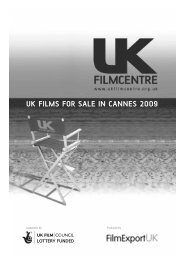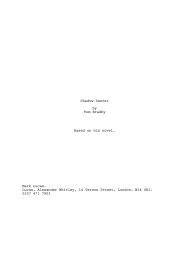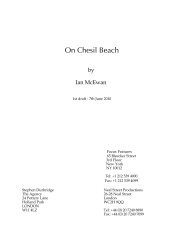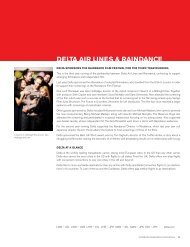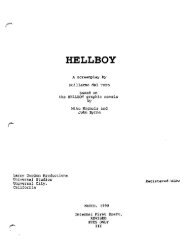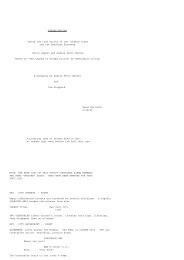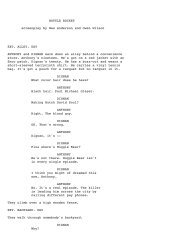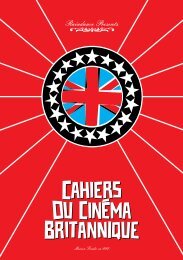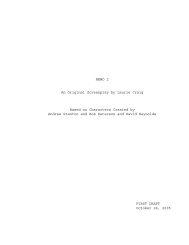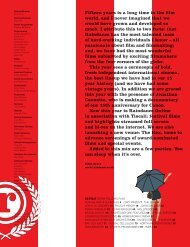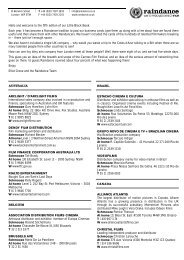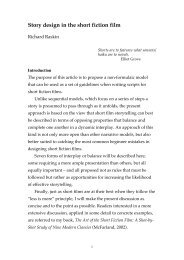T - Raindance Film Festival
T - Raindance Film Festival
T - Raindance Film Festival
Create successful ePaper yourself
Turn your PDF publications into a flip-book with our unique Google optimized e-Paper software.
NEW TITLES FROM THE DOGWOOF KENNEL<br />
www.dogwoof.com
PROUD SPONSORS OF THE RAINDANCE FESTIVAL<br />
We are London’s only<br />
full service film<br />
laboratory. Based in the<br />
heart of Soho, we offer<br />
full film post and<br />
printing services and a<br />
multi-format rushes<br />
service to cater for you.<br />
WE, LIKE YOU, LOVE WHAT WE DO
OUR THANKS TO<br />
Julia Brown, Amy Gustin, Ian Powell and<br />
Pat Gale at Apollo Cinemas, Kattarina<br />
McGrath at Delta Air Lines, Sally Reid<br />
and all at Ascent Media, Nick Leese,<br />
Junior Foster, Alex Rowley Megan Han<br />
and all at Organic, Ian McNaught and<br />
all at Pearl and Dean, Barry Wilson<br />
and all at London Calling, Maurice<br />
and Tom at the Phoenix, Candi Perez<br />
and Olvido Salazar Alonso at Instituto<br />
Cervantes, Matteo Fazzi and all at the<br />
Italian Cultural Institute, Junko Takekawa<br />
at the Japan Foundation, Brad Day and<br />
everyone at New Day Pictures, Nick<br />
Agha at Don’t Panic, Virginie Guichard<br />
at Electric Sheep, Antony and all at the<br />
Vinyl Factory, everyone at Total <strong>Film</strong>,<br />
Neil McCartney and Marcia Degia at the<br />
IFT, Danny Miller at Little White Lies,<br />
Zara Ballantyne-Grove, André Burgess<br />
and all at Crucible Media, Johanna von<br />
Fischer, Tessa Collinson and Shell Coe at<br />
BIFA, Ken Loach and Rebecca O’Brien<br />
at Sixteen <strong>Film</strong>s, Oli Harbottle and all at<br />
Dogwoof Pictures, Riz Ahmed, Armando<br />
Iannucci, Peter Bradshaw, Kerry Fox,<br />
Momoko Ando, Billy Childish, Christine<br />
Langan, Jon Ronson, Tom Waits, Jamie<br />
Graham, Andy Williams, Bill Martell,<br />
Kiyomi Nakazaki, Keiko Funato and all<br />
at Unijapan, all at Revolver, Vertigo <strong>Film</strong>s,<br />
Aida LiPera at Visit <strong>Film</strong>s, Deanne Sowter<br />
at E1 Enterntainment, Keiko Funato at<br />
U-Media, Keith Greenhalgh, Chris Auty,<br />
Will Stevenson, Dean Goldberg, Gee<br />
Vaucher, Penny Rimbaud, Jail Guitar<br />
Doors, Stephen Coates, Ronni Raygun<br />
Thomas, and all the volunteers who have<br />
helped us so much<br />
<strong>Raindance</strong> Patrons<br />
Nick Broomfield, Jonathan Caouette,<br />
Henrik Danstrup, Mike Figgis, Terry<br />
Gilliam, Ken Loach, Dave McKean, Martin<br />
Myers, Alan Parker, Jonathan Pryce,<br />
Marky Ramone, Vanessa Redgrave<br />
Benefactors<br />
Anastasia Atanesyan, Christopher<br />
Cameron, Simon Cameron, Matt<br />
Coughlan, Federico Forcolini, Sophie<br />
Galleymore Bird, Claude Green, Freddie<br />
Hair, Tiina-Annukka Heinomen, Helen<br />
Hoffman, Sam Holland, Hal Lever, Ann<br />
McTaggart, Fuad Omar, John Payten,<br />
Chris Perkins, Mariana Pimentel, Darren<br />
Priest, Cherry Read, Katharine Robinson,<br />
Janet Smith, Catherine Stanley, Adina<br />
Tarry, Lee Thomas, Roger Twohey, Stuart<br />
Wells, Tim Willrich<br />
In memory of<br />
Mark Shivas and<br />
Simon Channing-Williams<br />
PRINCIPAL SPONSOR<br />
MAJOR SPONSORS<br />
SUPPORTING PARTNERS<br />
CULTURAL PARTNERS<br />
MEDIA PARTNERS<br />
SEVENTEENTH RAINDANCE FILM FESTIVAL<br />
3
VENUES & MAP<br />
APOLLO CINEMA<br />
19 Lower Regent Steet<br />
London SW1Y 4LR<br />
Ticket Prices<br />
Full price £12 / Concs £8<br />
Box Office<br />
0871 220 6000<br />
Special Offers<br />
Screening Pass £150/£125*<br />
Discovery Pass £20<br />
*discount for premium members of<br />
<strong>Raindance</strong>, WFTV, students, OAPs<br />
RAINDANCE FILM CAFÉ<br />
The Vinyl Factory (Phonica)<br />
51 Poland Street<br />
London W1F 7LZ<br />
PHOENIX ARTIST CLUB<br />
104–110 Charing Cross Road<br />
London WC2H 0JN<br />
Screenings take place at the Apollo, unless otherwise specified<br />
Passes can be purchased online or by phoning 020 7387 3833<br />
and collected at the <strong>Raindance</strong> <strong>Film</strong> Café. It hosts seminars,<br />
masterclasses, screenings and events throughout the festival<br />
The Phoenix Artist Club is a private members bar underneath<br />
the Phoenix Theatre on Charing Cross Road. Passholders will<br />
have access to this marvelous late-night drinking establishment<br />
for the duration of the festival<br />
SEVENTEENTH RAINDANCE FILM FESTIVAL<br />
5
WEDS 30 SEPT<br />
THURS 1 OCT<br />
FRI 2 OCT<br />
SAT 3 OCT<br />
SUN 4 OCT<br />
MON 5 OCT<br />
TUES 6 OCT<br />
WEDS 7 OCT<br />
THURS 8 OCT<br />
FRI 9 OCT<br />
SAT 10 OCT<br />
SUN 11 OCT<br />
APOLLO CINEMA A<br />
19:00 Humpday<br />
14:30 House of Numbers<br />
16:45 Planeat: How to Feed a Planet<br />
19:00 You Won’t Miss Me<br />
21:15 Modern Love Is Automatic<br />
14:30 You Won’t Miss Me<br />
16:45 Shorts Programme 2<br />
19:00 25 Carats<br />
21:15 Down Terrace<br />
12:30 Digital Democracy Seminar<br />
14:15 Shorts Programme 3<br />
16:45 The Panda Candy<br />
19:15 Exam<br />
21:45 Colin<br />
13:30 Love Exposure<br />
18:30 Journey of the Childmen – The Mighty Boosh on Tour<br />
20:45 Storage<br />
15:00 Shorts Programme 5<br />
17:15 Son of the Sunshine<br />
19:30 The Overbrook Brothers<br />
21:45 Locked Out<br />
15:00 Crying with Laughter<br />
17:15 Shorts Programme 7<br />
19:30 In Your Name<br />
21:45 I Think We’re Alone Now<br />
13:45 Down Terrace<br />
16:00 Shorts Programme 8<br />
18:15 Until the Light Takes Us<br />
20:45 They Call It Acid<br />
14:45 Shorts Programme 9<br />
16:45 Shorts Programme 10<br />
19:00 Desire<br />
21:15 Popatopolis<br />
14:15 A Piece of Our Life – Kakera<br />
16:45 Shorts Programme 12<br />
18:30 The Cry of the Owl<br />
21:00 Deadline<br />
12:00 Exam<br />
14:15 Shorts Programme 13<br />
16:30 A Normal Life Please<br />
18:30 My Suicide<br />
21:00 A Necessary Death<br />
11:45 Shorts Programme 14<br />
14:15 Shorts Programme 15<br />
19:00 The Girlfriend Experience<br />
6 SEVENTEENTH RAINDANCE FILM FESTIVAL<br />
APOLLO CINEMA B<br />
15:00 Shorts Programme 1<br />
17:15 It Came from Kuchar<br />
19:15 Bomber<br />
21:30 Playing Columbine<br />
13:15 Bomber<br />
15:30 Peaches <strong>Film</strong> <strong>Festival</strong> Shorts<br />
17:45 The Narcotic Farm<br />
19:45 True Adolescents<br />
22:00 Easier with Practice<br />
13:15 My Big Break<br />
15:45 Vacation<br />
18:30 No One’s Son<br />
20:45 Redland<br />
12:15 Colin<br />
14:30 Chameleon<br />
17:00 Guts<br />
19:30 All the Years of Trying<br />
10:00 The Blair Witch Project<br />
15:15 No One’s Son<br />
17:30 At The Foot of a Tree<br />
19:45 Crying with Laughter<br />
22:00 The Longest Night<br />
13:45 Borges and I<br />
15:45 Shorts Programme 6<br />
17:45 Mime-Mime<br />
20:00 Mackendrick Lecture + Of Time and City<br />
14:30 Mime-Mime<br />
16:45 In Your Name<br />
20:45 A Piece of Our Life – Kakera<br />
14:30 Resurrecting the Street Walker<br />
17:00 Carmo – Hit the Road<br />
19:30 Lily <strong>Festival</strong><br />
22:00 Gogol Bordello – Non-Stop<br />
15:15 The Philosopher Kings<br />
17:15 The Investigator<br />
19:30 The Dinner Party<br />
22:00 Lalapipo<br />
12:00 Music & <strong>Film</strong> Panel<br />
14:15 Radar Video Panel<br />
19:00 The Twilight Dancing<br />
21:15 Stuck!<br />
11:45 SOS Love<br />
14:00 Ain’t No Tomorrows
APOLLO CINEMA C<br />
16:00 Hotaru<br />
18:15 The Slovenian Girl<br />
20:30 Instant Swamp<br />
16:00 Plymouth College of Arts: Short <strong>Film</strong>s Screening<br />
18:15 Werner Herzog: La Soufrière + The White Diamond<br />
14:00 Robyn Hitchcock – I Often Dream of Trains<br />
16:30 I Need That Record!<br />
18:45 Believe<br />
12:00 Bill Martell Seminar – Your Idea Machine<br />
13:45 Shorts Programme 4<br />
16:00 Day in the Life of My… + Hugh Metcalfe & Penny Rimbaud<br />
18:30 Borges and I<br />
13:45 25 Carats<br />
16:00 The Hand of Fatima<br />
18:30 Schemes of Affection<br />
13:45 Locked Out<br />
16:00 Breaking Rocks<br />
18:15 Moths<br />
13:45 Redland<br />
16:15 The Philosopher Kings<br />
18:15 Resurrecting the Street Walker<br />
14:15 The Longest Night<br />
16:30 The Director’s Cut<br />
18:45 EKV – As It Once Was<br />
14:15 Shorts Programme 11<br />
16:30 Special When Lit<br />
19:00 Memory and Desire – Stephen Duffy and the Lilac Time<br />
21:15 Miles Away<br />
12:30 The Slovenian Girl<br />
14:45 The Cry of the Owl<br />
17:00 Llik Your Idols<br />
19:15 We Fun<br />
21:30 The Life and Death of a Porno Gang<br />
12:00 Deadline<br />
14:15 The Dinner Party<br />
PROUD GALLERIES, CAMDEN<br />
18:30 Breaking Rocks Screening + Gig<br />
RAINDANCE FILM CAFÉ<br />
18:00 <strong>Raindance</strong> <strong>Film</strong> Café Opening Night with Billy Childish<br />
22:00 <strong>Film</strong>makers Networking Drinks<br />
13:00 Bill Martell Seminar: Guerilla Marketing Your Script<br />
15:00 Low Budget Make-Up Workshop<br />
17:00 The Making of Colin: Panel + Q&A<br />
19:00 Chinese Night with New Pants<br />
22:00 <strong>Film</strong>makers Networking Drinks<br />
15:00 Plug and Play<br />
19:00 Live!Ammunition!<br />
20:30 Live!Ammunition! Party<br />
22:00 <strong>Film</strong>makers Networking Drinks<br />
13:00 Bill Martell Seminar: More Sex and Violence<br />
15:00 Plug and Play<br />
19:00 Japanese Party<br />
22:00 <strong>Film</strong>makers Networking Drinks<br />
13:00 Bill Martell Seminar: Making a Scene<br />
18:00 Ctrl Alt Shift Party<br />
22:00 <strong>Film</strong>makers Networking Drinks<br />
13:00 Bill Martell Seminar: Structural Freaks<br />
18:00 Meet The Sales Agents<br />
22:00 <strong>Film</strong>makers Networking Drinks<br />
18:00 RFC Closing Night with The Ralfe Band<br />
22:00 <strong>Film</strong>makers Networking Drinks<br />
SCREENING<br />
SCHEDULE<br />
SEVENTEENTH RAINDANCE FILM FESTIVAL<br />
7
devil in the blood: From Christic masochism<br />
to satanic cruelty: religious extremes on film.<br />
E<br />
Legendary British horror<br />
House House of Whipcord) Whipcord)<br />
directs this colourful, low budget<br />
homage to the gangster thriller.<br />
Also includes Pete Walker’s pulp<br />
electric sheep Devil in the Blood<br />
a deviant view of cinema<br />
electric<br />
sheep<br />
0<br />
a deviant view of cinema<br />
Devil in the Blood<br />
From Christic masochism to satanic<br />
cruelty: religious extremes on film<br />
ALSO IN THIS ISSUE:<br />
The film magazine that explores the darkest corners of the cinematic basement<br />
AUTUMN 09<br />
£3.75 / €4.50 / $5.95<br />
White Lightnin’: a howling hillbilly hell trip<br />
Klaus Kinski as Jesus Christ Saviour<br />
The Imaginarium of Terry Gilliam<br />
<strong>Raindance</strong> 09 & Abandon Normal Devices<br />
www.electricsheepmagazine.com<br />
19/08/2009 09:02:55<br />
‘Ther’s tha devil movin’ in my blood’. The extraordinary White Lightnin’ explores the<br />
Old Testament world of demented mountain dancer Jesco White while Klaus Kinski<br />
disastrously reinterprets the New Testament in Jesus Christ Saviour – and subversives<br />
Alejandro Jodorowsky and Kenneth Anger dynamite divine myths.<br />
Plus: Terry Gilliam’s The Imaginarium of Doctor Parnassus, <strong>Raindance</strong> 09, Don<br />
Hertzfeldt, and louche mariachi rockabilly Dan Sartain picks his top films!<br />
Autumn issue on sale now.
Above 25 Carats, My Suicide, No One’s Son, Vacation, You Wont Miss Me<br />
Below Crying with Laughter, Desire, Down Terrace, Exam, Resurrecting the Street Walker<br />
FESTIVAL JURY PRIZES<br />
To recognize the outstanding achievements of the filmmakers showcased at the 17th <strong>Raindance</strong><br />
<strong>Film</strong> <strong>Festival</strong> in 2009, a number of jury prizes will be awarded. The winners will be announced<br />
before the screening of the Closing Night <strong>Film</strong> The Girlfriend Experience at the Apollo Cinema<br />
on Sunday 11 October at 7pm. The nominees are:<br />
BEST INTERNATIONAL FEATURE<br />
25 Carats [Spain]<br />
My Suicide [USA]<br />
No One’s Son [Croatia]<br />
Vacation [Japan]<br />
You Wont Miss Me [USA]<br />
BEST UK FEATURE<br />
Crying with Laughter<br />
Desire<br />
Down Terrace<br />
Exam<br />
Resurrecting the Streetwalker<br />
BEST DEBUT FEATURE<br />
The Dinner Party [Australia]<br />
The Longest Night [Germany]<br />
Mime-Mime [Japan]<br />
A Necessary Death [USA]<br />
Redland [USA]<br />
BEST MICRO BUDGET FEATURE<br />
All the Years of Trying [UK]<br />
Bomber [UK]<br />
Colin [UK]<br />
Locked Out [Japan]<br />
Memory and Desire[Canada]<br />
Son of the Sunshine [Canada]<br />
BEST DOCUMENTARY<br />
It Came from Kuchar [USA]<br />
My Big Break [USA]<br />
A Normal Life Please [Japan]<br />
The Philosopher Kings [USA]<br />
Special When Lit [UK]<br />
BEST UK SHORT<br />
SPONSORED BY DELTA AIR LINES<br />
Crazy Hands<br />
Infidel<br />
The Rules of the Game<br />
Screaming Skull<br />
The Taxidermist<br />
BEST INTERNATIONAL SHORT<br />
Hollywood Jerome [USA]<br />
The Mouse That Soared [USA]<br />
Of Best Intentions [Ireland]<br />
The Slow Game [Italy]<br />
Ten for Grandpa [Canada/USA]<br />
FILM OF THE FESTIVAL [SHORT]<br />
For the sixth consecutive year we are excited<br />
to present this award. Each year, the winner is<br />
offered the chance to film the following year’s<br />
trailer with the support of the Independent <strong>Film</strong><br />
Trust who helps finance the production.<br />
SEVENTEENTH RAINDANCE FILM FESTIVAL<br />
9
THE FESTIVAL JURY<br />
Riz Ahmed is an award-winning actor and musician. His films include Michael<br />
Winterbottom’s The Road To Guantanamo, and Shifty, for which he was nominated<br />
for a BIFA. As Riz MC he has played the Glastonbury <strong>Festival</strong> and the BBC<br />
Electric Proms, and in 2008 opened the Meltdown <strong>Festival</strong> with Massive Attack<br />
at the Royal <strong>Festival</strong> Hall.<br />
Momoko Ando began her experiences on a film set as a member of a film<br />
crew while still a student. After studying in England, her professor recommended<br />
that she travel to New York to complete a short program at New York University<br />
majoring in directing. Returning to Japan, she started her career as an assistant<br />
director to Eiji Okuda who is her father as well as an internationally acclaimed<br />
film director. With this critically applauded first feature, she is being hailed as the<br />
Japanese Sophia Coppola.<br />
Peter Bradshaw has been the Guardian’s film critic since 1998. He wrote and<br />
acted in Baddiel’s Syndrome (2001) and contributes regularly to BBC Radio, The<br />
Guardian, The Daily Telegraph and The Observer.<br />
Julia Brown is the Apollo Cinemas Commercial Director.<br />
Billy Childish is an English artist, author, poet, film maker, musician and<br />
filmmaker. He is known for his prolific work-rate – he has published 40 books of<br />
poetry, produced 2500 pictures and released over 100 albums – and is admired by<br />
people such as Kurt Cobain, Robert Plant, PJ Harvey & Jack White. He has been<br />
described as ‘one of the most outstanding, and often misunderstood, figures on<br />
the British art scene.’<br />
Kerry Fox is one of the world’s leading actresses. She received praise and a<br />
nomination from the Australian <strong>Film</strong> Institute Awards for her leading role in Country<br />
Life, starred in Danny Boyle’s breakout British hit Shallow Grave with Ewan<br />
McGregor, and was nominated for the Canadian Academy Award (Genie Award)<br />
for her supporting role in The Hanging Garden. In 2001 she won the Silver Bear<br />
for Best Actress in Intimacy at the Berlin <strong>Film</strong> <strong>Festival</strong> and is now starring in Jane<br />
Campion’s Bright Star, as well as a new West End play Speaking In Tongues.<br />
10 SEVENTEENTH RAINDANCE FILM FESTIVAL
Jamie Graham is the Deputy Editor of Total <strong>Film</strong> magazine.<br />
Armando Iannucci has written and produced numerous critically acclaimed<br />
television and radio comedy shows, notably On The Hour, which most famously<br />
spawned The Day Today and Alan Partridge. He has fronted his own satirical<br />
programmes for Radio 4 and written and directed The Thick of It, winner of Best<br />
New TV Comedy in 2005. His debut film, In the Loop, featuring Peter Capaldi and<br />
James Gandolfini, was a critical and commercial hit.<br />
Christine Langan is an English television and film producer. Her career began in<br />
the late 1980s when she worked for an advertising company, moving onto Granada<br />
Television where she produced three series of the comedy-drama Cold Feet. In<br />
2003 she produced the television play The Deal and later, in 2006, its theatrical<br />
follow-up The Queen. She joined BBC <strong>Film</strong>s in 2006, and was appointed Creative<br />
Director this year.<br />
Jon Ronson is a journalist, author, documentary filmmaker and radio presenter.<br />
His journalism and columns have appeared in British publications including The<br />
Guardian newspaper and Time Out magazine. He has made several documentary<br />
films for television and two documentary series for Channel 4. He wrote The Men<br />
Who Stare At Goats featuring George Clooney and directed Stanley Kubrick’s<br />
Boxes (2008).<br />
Tom Waits is a renowned musician, actor, singer-songwriter and composer. He<br />
has worked as a composer for movies and musical plays and was nominated<br />
for an Academy Award for his soundtrack work on One From The Heart. He has<br />
recorded 20 albums, winning Grammy Awards for two, Bone Machine and Mule<br />
Variations. His acting career includes roles in Rumblefish, Short Cuts and Bram<br />
Stoker’s Dracula. He is shortly to be seen playing the devil in Terry Gilliam’s The<br />
Imaginarium Of Dr Parnassus.<br />
Andy Williams is a BAFTA award winning television producer and writer who has<br />
produced work for the BBC, The Walt Disney Company, Channel Five and Turner<br />
Entertainment among many others.<br />
SEVENTEENTH RAINDANCE FILM FESTIVAL<br />
11
Opposite Alexander Mackendrick, © BFI/Artisan<br />
ALEXANDER MACKENDRICK WAS ONE OF EALING’S MOST TALENTED DIRECTORS.<br />
BUT, BY HIS OWN ADMISSION, HE FOUND HIMSELF ILL-EQUIPPED TO DEAL WITH<br />
HOLLYWOOD. FRED HOGGE LOOKS BACK AT THE CAREER OF A DIRECTOR WHOSE<br />
MEMORIAL LECTURES RETURN TO RAINDANCE THIS YEAR<br />
HERE’S A CURIOUS thought: had a nuclear war been declared, Alec<br />
Guinness may well have owned the last face to be shown on British television.<br />
The penultimate broadcast, before the pre-recorded voice of Peter Donaldson<br />
announced our imminent doom, would most likely have been an Ealing<br />
comedy. Oh, how thick the irony had it been The Man in the White Suit,<br />
Alexander Mackendrick’s satire about the bomb itself.<br />
Mackendrick is a director whose body of work has slowly-slowly re-established its reputation.<br />
Always well-reviewed in his day, he has never been revered like David Lean or Carol Reed,<br />
his direct contemporaries in British cinema.<br />
This may be because of his five film spell at Ealing Studios, the home of cosy English nostalgia.<br />
But Mackendrick was never cosy, and never nostalgic. His Ealing films are all deliciously ambiguous.<br />
If it’s cosiness you want, it’s there for you. But there too, with equal clarity, is a rage and wit<br />
of formidable acuity, pushing the very limits of the Ealing brand.<br />
It may be because his Hollywood career did not unfold so smoothly. While Sweet Smell<br />
of Success, which he made for Burt Lancaster’s production outfit HHL, now is recognised<br />
SEVENTEENTH RAINDANCE FILM FESTIVAL<br />
13
–<br />
–<br />
SHARE THE (FILM) LOVE, SUPPORT THE CAUSE…<br />
The Independent <strong>Film</strong> Trust was established to advance<br />
the cause of independent filmmaking<br />
The Independent <strong>Film</strong> Trust works with the British<br />
Independent <strong>Film</strong> Awards and the <strong>Raindance</strong> <strong>Film</strong> <strong>Festival</strong><br />
with the aim of seeking out and showcasing the best in<br />
independent film, promoting innovation and celebrating<br />
the vitality and diversity of the sector<br />
The Independent <strong>Film</strong> Trust is proud to be the sponsor of:<br />
The <strong>Raindance</strong> <strong>Film</strong> of the <strong>Festival</strong> Award<br />
and the <strong>Raindance</strong> <strong>Film</strong> <strong>Festival</strong> trailer<br />
The <strong>Raindance</strong> Training Scholarships<br />
–<br />
The <strong>Raindance</strong> <strong>Film</strong> School in a Box programme<br />
Find out more at www.independentfilmtrust.org<br />
For further information contact Commercial Director<br />
Marcia Degia at marcia@independentfilmtrust.org<br />
And for regular updates please find our group on facebook<br />
Patrons<br />
Alan Parker / Michael Caton-Jones / Mike Leigh / Bill Forsyth / Tim Roth / Nick Broomfield / Samantha Morton / Faye Dunaway
‘ Mackendrick was never cosy, and<br />
never nostalgic. he did not present<br />
his work as art or himself as an<br />
auteur. Instead he was a craftsman’<br />
as one of the high points of 1950s cinema, it wasn’t exactly a hit. Add to that his dismissal from<br />
HHL’s follow-up picture, The Devil’s Disciple, and then from The Guns of Navarone, not to mention<br />
MGM’s re-cutting of A High Wind in Jamaica: suddenly, compared to Lean and Reed, Mackendrick’s<br />
reputation seems diminished.<br />
Hollywood didn’t suit him. He said ‘At Ealing… I was tremendously spoiled with all the logistical<br />
and financial troubles lifted off my shoulders, even if I had to do the films they told me to do… When<br />
I arrived here… I found that in order to make movies in Hollywood, you have to be a great dealmaker…<br />
I have no talent for that… I realised I was in the wrong business and got out.’<br />
Or it may be because he himself did not much like the so-called ‘cult of the director’. So he<br />
did not present his work as art or himself as an auteur. Instead he was a craftsman who, as a<br />
teacher, passed on his understanding of craft to his students. And it is largely through his book,<br />
On <strong>Film</strong>making, edited by Paul Cronin, that his work has come to be re-appreciated by new<br />
audiences. Mackendrick, the consummate perfectionist, who wrote that ‘the great directors manage<br />
to disappear and dissolve into their work’, emerges inadvertently as an auteur, with preoccupations<br />
and thematic concerns running in rich veins throughout his work. Craft comes before art, and his<br />
dedication to craft allows us now, in retrospect, to appreciate the art of his work.<br />
Mackendrick left filmmaking to teach film direction at CalArts in Pasedena. There were precious<br />
few film schools at the time. Training back then was an on-the-job thing. The film schools, such<br />
as they were, were focused on appreciation, on criticism of film as an art. So Mackendrick was<br />
inventing a tradition for the teaching of directing and screenwriting from scratch. For that,<br />
we at <strong>Raindance</strong> and at film facilities everywhere, owe him a great debt.<br />
I wrote in the programme notes to the first Alexander Mackendrick lecture: ‘Where many can<br />
claim to have made films, few can say they made filmmakers. He could, and at <strong>Raindance</strong> that<br />
is something we respect beyond measure.’ So it’s with real pleasure that, this year, we restore<br />
the Alexander Mackendrick Memorial Lecture to the <strong>Raindance</strong> schedule.<br />
Fred Hogge interviews Terence Davies at the Alexander Mackendrick Memorial Lecture takes place at 8pm on Tuesday<br />
6 October at the Apollo Cinema, followed by a screening Of Time and the City<br />
SEVENTEENTH RAINDANCE FILM FESTIVAL<br />
15
IN OUR RETROSPECTIVE SCREENING THIS YEAR FRED HOGGE LOOKS BACK<br />
TO 1999’S OPENING NIGHT FILM AND TELLS THE INSIDE STORY OF HOW<br />
THE BLAIR WITCH PROJECT CAME TO RAINDANCE<br />
THERE ARE TWO things I remember,’ Ian George, former head of marketing<br />
at Pathé, tells me over the phone. ‘It was possibly the trendiest festival opening<br />
I’ve ever seen! Most of the music business were there: the Gallagher brothers,<br />
the Verve. And the second one was the plastic trees.’<br />
I’d forgotten the plastic trees.<br />
‘They were spilling out onto the street; they were the only dressing there was!’<br />
Speaking from Washington, Blair Witch co-director Eduardo Sanchez, says: ‘It was this huge,<br />
massive thing.’<br />
Says Sandra Grant, then the <strong>Raindance</strong> head of PR: ‘I just remember all the paparazzi in the press<br />
pens screaming at me to be allowed into the screening. Even I didn’t get into the screening because<br />
I gave up my ticket to Claudia Schiffer.’<br />
And as for Elliot – he says: ‘It was just insane.’<br />
Ten years on, as <strong>Raindance</strong> gears up for its seventeenth opening night, the Blair Witch Project<br />
premiere remains fresh in the <strong>Festival</strong>’s collective memory. The film was a global phenomenon.<br />
But as with all these things, when it began, its ambitions were much more humble.<br />
16 SEVENTEENTH RAINDANCE FILM FESTIVAL<br />
Opposite Dave Stewart & Nicole Appleton, <strong>Raindance</strong> 1999
‘The main thing was to try and make a scary film,’ Ed recalls. ‘You know, in the early ’90s, when<br />
we came up with it, there weren’t many scary movies coming out. And Dan and I started talking<br />
about the movies that scared us as kids.’<br />
Says Dan: ‘We had a common interest in a lot of the old ’70s mockumentaries like In Search<br />
of… and Ancient Astronauts. We found them to be very creepy, mainly due to the fact that they<br />
were portrayed as being real, or dramatisations of real events. So we thought it would be interesting<br />
to create our own fictional “real event”, and build a narrative film around it.’<br />
Shooting began in early 1997, for a film which would feature the first-person footage of characters<br />
Heather, Mike and Josh, supported by archival footage and interviews.<br />
Ed: ‘That was the original idea for the film. But we realised that every time we cut away from<br />
the first-person footage, we lost a certain magic that the footage was creating. And in the end, right<br />
before we entered Sundance, we thought: “OK, let’s just go with the footage and forget about<br />
any of this other documentary stuff.”’<br />
Dan: ‘It was this kind of creative evolutionary process: as we were going along, it ended up in<br />
a place we hadn’t necessarily pre-conceived when we started shooting.’<br />
It was this evolutionary process which would begin to capture people’s imaginations.<br />
Ed: ‘About a year before Sundance, we had got some limited exposure on John Pierson’s show,<br />
Split Screen. And that particular episode, about the Blair Witch, blew up on their website. There<br />
were people discussing it, trying to get more information. So we were, like, we’ve gotta get our<br />
own website up.’<br />
Dan: ‘That got the initial interest going, which built up momentum for our website, which in turn<br />
built up momentum going into Sundance.’<br />
Ed: ‘When the site went up, we started getting a lot of traffic. And I started beginning to feel the<br />
heat, the kind of pitched interest in this thing. Heather Donahue kept a journal when she was in the<br />
woods. And it was a very cool, creepy journal. So I scanned all the pages, transcribed everything, and<br />
I would put up a new page every week or two. But I would hide the page. And people would scour<br />
the site, and if they found it too quick, I would change the URL. So I began to feel the momentum<br />
that the film was carrying. And I was thinking, “Man, if we could just get into Sundance and find<br />
an audience, I think this thing is going to be pretty huge for an indie film.”’<br />
Dan: ‘Initial screenings with reviewers<br />
‘ I couldn’t get in because<br />
I had to give up my ticket<br />
for Claudia Schiffer’<br />
were very positive. The film was really<br />
getting embraced early on, and once we<br />
were at Sundance, we were kind of the<br />
film to watch. And by the time we got to<br />
Cannes, that’s when it started dawning on<br />
us, I suppose, that we had something that was going to be bigger than your typical cult movie.”<br />
Ian George: ‘It was bought for us by Berenice Fugard. And the price, well it was so low that she<br />
didn’t even need approval from the higher ups. And then the US release happened. It exploded in<br />
the US. It was a phenomenon. They’d done a real grassroots thing, and it was a phenomenon.’<br />
Even before that, the film was making waves in Cannes.<br />
Elliot: ‘That’s where I heard about it. So I hounded Pathé for it. Finally, I got through to Maj-Britt<br />
Kirchner, who was running Pathé at the time. And I kept bumping into her on the street. Well…<br />
I kinda got her schedule… Then, one day I got a call from Margaret, saying: “I think <strong>Raindance</strong><br />
is the perfect place for Blair Witch.”’<br />
Ian George: ‘You couldn’t have got a better platform for us. A lot of European territories had<br />
rushed it into release to capitalise on the US thing. But we felt we needed to replicate their<br />
SEVENTEENTH RAINDANCE FILM FESTIVAL<br />
19<br />
Opposite Noel Gallagher at the London premiere of The Blair Witch Project, <strong>Raindance</strong> 1999
Happy to be hosting<br />
The perfect location at which to<br />
host your Corporate Events,<br />
Product Launches, Press<br />
Shows, Conferences,<br />
Private Parties, Preview<br />
Screenings, <strong>Film</strong><br />
Premieres and<br />
Presentations.<br />
For event information<br />
and booking contact<br />
amyg@apollocinemas.com<br />
For film info or to book tickets for <strong>Raindance</strong> or any other film<br />
0871 220 6000 or www.apollocinemas.com<br />
Apollo Piccadilly Circus, 19 Regent Street, London, SW1Y 4LR
campaign, to step up to the plate ourselves. We decided to go with <strong>Raindance</strong> and a Halloween<br />
release, and to keep it underground. We came up with the strategy and the strap-line: “Everything<br />
you’ve heard is true.” It gave us the chance to be playful.’<br />
Elliot: ‘I announced Blair Witch. We sold the tickets. And then Ian calls me up. Can we have tickets<br />
for this person, and for that person. Suddenly, I have 400 tickets sold for a 200 seat cinema.’<br />
Dan: ‘In our minds, everything was total chaos. It was all coming so fast, yet everything was<br />
getting done. It was really like being caught in a river of rapids, and you know you’re going to get to<br />
the other end of the river somehow, but you don’t know how or where the current’s gonna take you.<br />
And by the time we got to the UK, we were stunned. The response at <strong>Raindance</strong>…’<br />
Ed: ‘It was totally frickin’ cool.’<br />
Dan: ‘There was this kind of fervour and rock-star status we had, that I didn’t even contemplate<br />
when we were making the movie. Even to this day, it was quite surreal.’<br />
Ian George: ‘We wanted lines around the block. We got absolute chaos, and it was fantastic.’<br />
Elliot: ‘Blair Witch put us on the map, simple as that.’<br />
Ten years on, the effects of the film can still be felt on the indie film scene. Its marketing strategy,<br />
conceived just as the internet went mainstream, changed the way that filmmakers try to reach and<br />
nurture their audiences.<br />
Says Ed: ‘I mean, look, we didn’t invent this. There were other movies that had come before that<br />
had used the same aesthetic. But for us, it was a kind of combination of using these things in the<br />
horror mode, and it was our only solution to make a cheap film. And it was like lightning in a bottle.’<br />
Dan: ‘We started from an emotional standpoint, with “how do we scare ourselves”. And we built<br />
a movie around that. You can do that in all sorts of different styles and all sorts of different ways<br />
— every story has its own DNA, its own mythology. The trick is trying to make a good, solid film.’<br />
The Blair Witch Project is certainly that, and a bona fide hit too, a genuine independent which<br />
caught a global imagination. We’re delighted to screen it again as this year’s retrospective.<br />
The Blair Witch Project screens at 10pm on Sunday 4 October at the Apollo Cinema<br />
SEVENTEENTH RAINDANCE FILM FESTIVAL<br />
21<br />
Eduardo Sanchez, Elliot Grove and Daniel Myrick at <strong>Raindance</strong> 1999
38 SEVENTEENTH RAINDANCE FILM FESTIVAL
Opposite Momoko Ando<br />
JAPANESE WOMEN FILMMAKERS HAVE NEVER BEEN IN THE LIMELIGHT BUT THEIR<br />
INFLUENCE AND CONTRIBUTION TO CINEMA IN JAPAN IS UNDISPUTABLE. THIS YEAR<br />
RAINDANCE CELEBRATES THEIR ACHIEVEMENTS AND JASPER SHARP DISCUSSES<br />
JAPAN’S LEADING WOMEN FILMMAKERS<br />
IN AN ERA when young men are more likely to be holed away playing video games than<br />
queuing to catch the latest Michael Bay blockbuster, the huge revenues generated by<br />
Mama Mia, Sex and the City and Twilight last year emphasised a point that to many has<br />
been obvious all along: that a sizeable chunk of movie audiences worldwide are women.<br />
It’s estimated this market share is around the 75% mark in Japan, a fact those in the<br />
industry have long been party to. Back in the 1950s, Shiro Kido, the pragmatic president<br />
of Shochiku, explained his rationale for targeting this very demographic with his sentimental ‘Ofunaflavour’<br />
melodramas, named after the studio where they were made: ‘Women never go to the cinema<br />
alone. They will always bring either a friend or a lover. Another thing is their voluntary promotional<br />
activity: she will convince acquaintances to go and see the film she has just seen.’<br />
But ask someone to reel off a list of ten Japanese directors, and it’s doubtful you’ll hear a<br />
woman’s name amongst the roll call. They’ll most likely list such lofty auteurs as Akira Kurosawa<br />
or Nagisa Oshima, or cult directors like Takeshi Kitano or Takashi Miike. Even among those towering<br />
figures praised for their feminist (feminisuto) opuses back in the day, namely Kenji Mizoguchi<br />
and Mikio Naruse, or the contracted directors of Shochiku such as Yasujiro Ozu and Keisuke<br />
SEVENTEENTH RAINDANCE FILM FESTIVAL<br />
23
Kinoshita who made the studio’s classic romances or home dramas featuring iconic actresses such<br />
as Setsuko Hara or Hideko Takamine, you’d be hard pushed to pick out a single woman behind the<br />
camera.<br />
It would be unfair to level any accusations of chauvinism solely at Japan, as by and large the<br />
pattern was similar across the world. Even now it isn’t much better. While you’ll notice a strong<br />
female presence at the front-office end of the business – as promoters, interpreters, journalists,<br />
festival organisers – sadly this is not the case at its creative heart. According to global industry<br />
reports, only 6% of directors and 12% of screenwriters worldwide are women, a statistic that sees<br />
the Japanese industry in a pretty positive light.<br />
The rising tide of women filmmakers in Japan should rightly be regarded as among the most<br />
significant developments of the past decade, and is now virtually impossible to ignore, with the<br />
last twelve months seeing a spate of titles from names like Yuki Tanada, Naoko Ogigami, Satoko<br />
Yokohama, Tsuki Inoue, Miwa Nishikawa, Mari Asato and Shimako Sato, most of whom have at least<br />
a couple of features under their belts, in genres including comedy, drama, erotic, horror, action. It’s<br />
also worth remembering the other roles women play behind the camera too. Last year’s criticallygarlanded<br />
Tokyo Sonata not only boasted a female cinematographer, Atsuko Ashizawa, but the<br />
producer Yukie Kito, who effectively hired director Kiyoshi Kurosawa for the project.<br />
This phenomenon has already been identified as an important point of discussion in one overseas<br />
festival this year, Frankfurt’s Nippon Connection, and so it seems fitting that the 17th <strong>Raindance</strong><br />
celebrates it too with a special focus featuring five features and one shorts programme all directed<br />
by Japanese women, and the world premiere of A Piece of Our Life – Kakera, the debut feature<br />
of Jury Member Momoko Ando (whose sister Sakura also appears in two of this year’s selection,<br />
Love Exposure and Ain’t No Tomorrows).<br />
To what should we attribute these changes? Before the 1980s, women directors in Japan virtually<br />
all came from an acting background. Tanaka Kinuyo has been seen as something of a pioneer<br />
in this respect, though the six films she made from her 1953 debut Love Letter to Love Under the<br />
Crucifix in 1962 were never as popular as her performances in the films of Kenji Mizoguchi. Sachiko<br />
Hidari directed and starred in The Far Road (1977), a social drama about the family of a railroad<br />
worker, while another, Midori Kurisaki made Love Suicides at Sonezaki (1981) as a live-action<br />
traditional Bunraku puppet film. Others like Sumiko Haneda and Toshie Tokieda worked in the<br />
field of documentary. The one major exception was Japan’s first woman director, Sakane Tazuko,<br />
a protegée of Mizoguchi who directed only one feature, First Figure (1936), based on Émile Zola’s<br />
Nana. The film is now lost, and even these other works are nigh on impossible to see.<br />
The hierarchical corporate structure of the major studios was the main bar to women entering<br />
the industry, and so it seems perversely fitting that the subversive sphere of the independent erotic<br />
24 SEVENTEENTH RAINDANCE FILM FESTIVAL<br />
Mime Mime
‘pink film’ should have provided an avenue for potential women helmers. Again, many came from<br />
a performing background, including Kyoko Ogimachi, the genre’s first female director with Yakuza<br />
Geisha in 1965, but it does seem ironic it was this softcore sex film sector that fostered the first<br />
women with any real power in the industry: the current president of Kokuei production company<br />
Keiko Sato, and Sachi Hamano, not only the first woman to forge a successful long-term career<br />
as a director, but with over 400 films under her belt, by far the most prolific. Alongside her numerous<br />
pink films, Hamano has directed indie films with more emphatically feminist themes, including Lily<br />
<strong>Festival</strong> (2001), part of this year’s focus at <strong>Raindance</strong>.<br />
But the most significant development has been in the opportunities provided within the<br />
burgeoning indie scene, bolstered through the support of the Pia <strong>Film</strong> <strong>Festival</strong>. Established in the<br />
late 1970s to provide an industry entry point to jishu eiga (amateur) filmmakers, PFF’s beneficiaries<br />
include Shiori Kazama, Naoko Ogigami, Noriko Shibutani (whose Bambi Bone played <strong>Raindance</strong><br />
in 2006, along with Yuki Tanada’s Moon and Cherry) and this year’s Mime-Mime by Yukiko Sode.<br />
Though not a PFF alumni, Naomi Kawase also hails from this jishu eiga background. Following<br />
her series of 8mm confessional shorts, her first feature Suzaku won the Camera d’Or at Cannes<br />
in 1997, causing a media storm in Japan<br />
‘ It seems perversely fitting<br />
that the subversive sphere<br />
of the independent erotic<br />
“pink film” should have<br />
provided an avenue for<br />
potential women helmers’<br />
and giving rise to a new genre of ‘films<br />
by women directors.’ The hubbub has<br />
died down to some extent now, and<br />
this new wave is no longer seen as<br />
something distinct from the norm, just<br />
another feature on the wide-ranging<br />
landscape of Japanese cinema. Many<br />
of the directors don’t see gender as<br />
having any bearing on the type of films<br />
they make, as Yuki Tanada told<br />
me, ‘I think if you had the same script and gave it to a different filmmaker, whether they were<br />
male or female, a different movie would come out.’<br />
Perhaps Atsuko Ohno, producer of films including Takashi Shimizu’s horror Marebito: The<br />
Stranger from Afar (2004) and organiser of the annual Peaches <strong>Festival</strong>, which showcases up-andcoming<br />
female talent, best sums up the the sea change: ‘I wasn’t quite sure if there was a need for<br />
this festival, but I’m a woman, I have a lot of women drinking buddies and friends making films, so<br />
I just thought, “Why not?” I’m not any sort of woman’s lib-type person, or some sort of feminist, but<br />
I thought maybe it’s just a way of categorising the films.’ It’s a sentiment I hope is reflected in this<br />
year’s <strong>Raindance</strong> programme too.<br />
SEVENTEENTH RAINDANCE FILM FESTIVAL<br />
25<br />
Ain’t No Tomorrows
SHION SHON IS ONE OF JAPAN’S MOST NOTABLE AND ENIGMATIC DIRECTORS.<br />
JAPANESE FILM PROGRAMMER JASPER SHARP RETRACES HIS CAREER AND<br />
EXAMINES HIS LATEST FEATURE LOVE EXPOSURE<br />
THE WORD ‘MAVERICK’ gets bandied around too often in film circles nowadays,<br />
but if there’s ever a director who deserves the label, it’s Shion Sono. It’s difficult<br />
to think of a less commercial proposition than Love Exposure, which premiered<br />
last December at Tokyo <strong>Film</strong>ex. For starters, it’s around four hours long, an almost<br />
suicidal proposition in a commercial environment where venues need to cram<br />
as many films into their schedules as possible, and where certain countries’<br />
censorship boards charge by the minute. And then there’s the content, taking onboard such heady<br />
subjects as child abuse, Catholic repression and murderous religious cults within its epic span.<br />
If all this sounds a less-than-tempting proposition, one should add that the results are not only<br />
rather moving, but incredibly good fun. The films of Todd Solondz provide a convenient point<br />
of reference in their irreverent treatments of the various societal taboos that might be best left<br />
to grittier socio-realist works by more serious directors, but rendered as a colourful pop-cultural<br />
fantasy, the theatre of the absurd that is Sono’s film is an altogether more exuberant affair.<br />
One hesitates to call Love Exposure a comedy, though there are certainly some funny moments.<br />
Switching dramatic registers and defying expectations at every turn, there’s enough material<br />
26 SEVENTEENTH RAINDANCE FILM FESTIVAL<br />
Opposite Shion Sono
for several films in the first half alone, and you’ve got to admire the balls of a director bold enough<br />
to put the film’s title credit an hour into proceedings.<br />
Shion Sono’s name may be unfamiliar, but he’s actually been around some time, with his previous<br />
film, Exte, a J-horror pastiche about killer hair extensions featuring Battle Royale / Kill Bill icon<br />
Chiaki Kuriyama released on DVD in the UK. Laying the two works side-to-side, it’s immediately<br />
apparent that this is not an easy filmmaker to pigeonhole. Sono’s debut, Bicycle Sighs (1989), a<br />
16mm indie feature about two no-hoper university chums who have deferred their final exams for<br />
the past three years, instead surviving by delivering newspapers while one strives to complete the<br />
super-8 masterpiece they began as adolescents, was one of the standout titles of the 1990 Pia <strong>Film</strong><br />
<strong>Festival</strong>, also playing widely at numerous overseas festivals. This was followed by a number of more<br />
experimental titles, including Room (Heya, 1992), in which a murderer looks for a new apartment,<br />
his estate agent leading him across a Tokyo cityscape blighted by the collapse of Japan’s economy,<br />
and Keiko Desu Kedo (1997), about a lonely waitress who obsessively records every event in time<br />
following the death of her father to cancer, and several forays into the world of the erotic pink film,<br />
including one gay title, Dankon: The Man (1997).<br />
But it was the opening of his 2001 cult hit Suicide Circle, in which a phalanx of 54 uniformed<br />
schoolgirls leap in unison beneath an oncoming rush-hour train at Shinjuku station, that really got<br />
people talking. From then on, Sono has<br />
‘ For a start it’s around<br />
four hours long, an almost<br />
suicidal proposition’<br />
continued to dazzle Japanese film fans<br />
with works including Noriko’s Dinner<br />
Table (2005), a more sober companion<br />
piece to this breakthrough film, and<br />
Strange Circus (2005), an erotic-<br />
grotesque work that takes place in, as the title suggests, a strange circus. This eccentric embrace<br />
of radically different subject matters and genres is reflected throughout the entirety of Love<br />
Exposure, but even as the film continues its trail picking up film festival prizes and plaudits across<br />
the world unabated, Sono is forging ahead into new and even odder territory. After already popping<br />
out another film, the surprisingly modest family drama Be Sure to Share, he’s currently shooting<br />
his first English-language feature Lords of Chaos, based on the early-90s Norwegian Black Metal<br />
scene detailed in Aaron Aites and Audrey Ewell’s documentary Until the Light Takes Us, also<br />
playing at <strong>Raindance</strong>, with Jackson Rathbone (aka Jasper of the Twilight films) touted as playing<br />
the murderous Varg Vikernes. Now that is strange…<br />
Love Exposure screens at 1.30pm on Sunday 4 October at the Apollo Cinema<br />
28 SEVENTEENTH RAINDANCE FILM FESTIVAL<br />
Love Exposure
���������������������<br />
��������������������<br />
�������������<br />
�������<br />
�������<br />
�������������������������������������������������������������������������<br />
����������������������������������������������������������������������������<br />
������������� � ����������������������������������������������������������������<br />
�������������<br />
�� ������������������������������������������������������������������<br />
�� ���������������������������������������������������������������������<br />
������������������������������������������������������<br />
�� ������������������������������������������������������<br />
�� ������������������������������������������������������������������<br />
�������<br />
�� ������������������������<br />
�� ������������������������������������������������������������������<br />
�� �������������������������<br />
���������������������������<br />
�������������<br />
������ ������� �������� �������� ����� ��������� ���<br />
�������������������������������������������������<br />
���� ������ ��������� ��������� ������� ����� ��������<br />
������������������������������<br />
����<br />
���� ��� ���� ���������� ����� ���������� �������<br />
������� ���������� ����� ��������� ���������� ����<br />
��������������������������������������������������<br />
��� ���� ���������� ����������� ��������� ����������<br />
�������������������������������������������������<br />
��������������������������������������������������<br />
�����������������������������������<br />
����<br />
���������������������������������������������<br />
��������� �������� ��� �������������� ������� ���<br />
��������� ������ ���������� ���� ��� ���� ����������<br />
�������� ����� ����������� ��� ���� ��� ����� �������<br />
������ ��� ���� ������ ���� ����� ����� ����������<br />
�����������������<br />
��������������<br />
���� ������� � � ����������� ������� ��� ��������<br />
�������������������������������������������������<br />
���������������������������������������������<br />
���������� ��� ���������� ������������� ���� �������<br />
�������������������������������������������������<br />
����� �������� �������� ���� �������������� �����<br />
��������������������
Opposite Billy Bragg with Mick Jones<br />
BILLY BRAGG’S ATTEMPTS AT HELPING PRISON INMATES REHABILITATE TO THE OUTSIDE<br />
WORLD HAVE BEEN DOCUMENTED IN A FASCINATING DOCUMENTARY BY ALAN MILES.<br />
PAT GILBERT EXAMINES HOW IT ALL CAME ABOUT<br />
IN EARLY 2007, documentary filmmaker Alan Miles received a phone call from Billy<br />
Bragg with a remarkable proposition – he wanted Miles to shoot footage of a visit<br />
Billy was making to Guys Marsh prison in Dorset. The songwriter and man once dubbed<br />
a ‘one-man Clash’ was delivering the gift of some acoustic guitars to a prison worker<br />
called Malcolm Dudley, so inmates in his music class could practise the instrument<br />
between lessons. The visit marked the beginning of Bragg’s Jail Guitar Doors campaign,<br />
the extraordinary story of which is told in Miles’ gritty and uplifting new film, Breaking Rocks.<br />
For the filmmaker, that first trip into Guys Marsh opened his eyes to the reality of life behind bars,<br />
and the need for an emphasis on rehabilitation in the prison system. ‘People think prison is an easy<br />
ride,’ explains Alan Miles, who juggles filmmaking with his day-job as a firefighter. ‘But when you<br />
hear those keys rattling, the banging of doors, the constant process of locking and unlocking… it’s<br />
claustrophobic and scary. Inmates can be locked up for 20 hours a day, and when they’re let out<br />
to “associate” together it’s very tense. Getting them involved in music at least gives them an outlet.’<br />
For Billy Bragg, the appeal from Malcolm Dudley – who died suddenly from a heart attack<br />
in 2008 – for help supplying instruments for his workshop struck an instant chord. ‘I understood<br />
SEVENTEENTH RAINDANCE FILM FESTIVAL<br />
33
how playing an instrument helps you transcend your surroundings, and how valuable that could be<br />
in a prison cell,’ says Billy. ‘Prison has to be about much more than just locking people up – we want<br />
people to be able to move on from their situation and reconnect with the outside world, and my<br />
hunch was that playing an instrument – particularly a guitar – could help that.’<br />
The edgy subject matter of Breaking Rocks will come as no surprise to admirers of Alan Miles’<br />
work – nor will the film’s emphasis on the redemptive power of music, with its apparent ability to<br />
heal social, political and spiritual rifts. Miles’ last film, 2005’s Who Shot The Sheriff?, focused on the<br />
story of the late ’70s Rock Against Racism movement and its legacy today in the Love Music, Hate<br />
Racism campaign. His cinematic debut, The Last Night London Burned, made three years earlier,<br />
documented the poignant events of 9 November 2002, when The Clash’s estranged songwriters<br />
Joe Strummer and Mick Jones shared a stage together for the first time in 19 years at a benefit<br />
gig in west London for striking firefighters.<br />
‘ People think prison is<br />
an easy ride but when<br />
you hear those keys<br />
rattling, the banging<br />
of doors, the constant<br />
locking and unlocking<br />
it’s claustrophobic<br />
and scary’<br />
‘The Strummer and Jones thing was a sheer<br />
stroke of luck,’ smiles Alan, who studied parttime<br />
for his degree in <strong>Film</strong> & TV Production<br />
from Hertfordshire University. ‘The Fire Brigades<br />
Union heard I made films and invited me to travel<br />
around Britain to document the two-day firefighters’<br />
strike in November 2002. When Mick<br />
got onstage with Joe that night I just ran and<br />
got my camera – I wasn’t filming the gig. Then<br />
when Joe died a few weeks later I felt moved<br />
to make sense of it all in a film.’<br />
As the Jail Guitar Doors initiative – the<br />
campaign is named after a Clash B-side –<br />
gathered momentum throughout 2007 and 2008, Alan Miles was there with his camera to capture<br />
the drama. He was privileged, he says, to film interviews with The Clash’s Mick Jones and Topper<br />
Headon, and, to complete the set, once arrived in a fire engine outside the home of The Clash’s<br />
bassist Paul Simonon to secure his signature on a prison-bound acoustic guitar.<br />
The most compelling scenes in the film, however, almost inevitably centre around Bragg’s prison<br />
visits, to talk with prison workers, officials and see donated JGD instruments in use. Miles admits<br />
that filming this footage was his biggest challenge. ‘I’ve always been very careful,’ he explains. ‘There<br />
are some people in prison you can’t film for legal reasons but, also, you have to be aware that some<br />
of the inmates might be embarrassed to be inside, or perhaps someone in the audience<br />
SEVENTEENTH RAINDANCE FILM FESTIVAL<br />
35<br />
Left to right JGD graduates: Jonny Neesom, Leon Walker, Louise Wells and Theone Coloeman
����<br />
���������<br />
�� �������������������������<br />
����������<br />
������������������������<br />
����<br />
������<br />
��<br />
�����������������<br />
��� �����<br />
����<br />
�����������<br />
����� ��������<br />
���������������������<br />
��<br />
�����������<br />
����������<br />
����<br />
���������<br />
���������������������<br />
��������������<br />
�����������������������������������������������������������������������<br />
��<br />
+ free!<br />
on sale now<br />
For blockbuster subscription oFFers visit<br />
www.total<strong>Film</strong>.com/subscribe<br />
avatar<br />
jennifer’s body<br />
poster!<br />
and
who doesn’t understand the bigger picture of what we’re trying to achieve may not want to see<br />
a particular inmate on the screen.<br />
‘In Dartmoor, within ten minutes of me filming, quite a crowd had gathered and were larking about<br />
in front of the camera. It brought home just how bored people get in there. Inmates were getting<br />
boisterous, screaming and shouting, so then you had to manage the situation and move on quickly.’<br />
As Breaking Rocks pointedly shows, Jail Guitar Doors is already paying dividends, with several<br />
former inmates who were given access to guitars through the scheme now making waves as<br />
performers. Four of these graduates – Jonny Neesom, Leon Walker, Louise Wells and Theone<br />
Coleman – will be playing at the premiere of the film at the Proud Gallery in Camden Town on<br />
1 October. Billy Bragg admits he’s immensely proud of them, and says ‘they’ve got something to<br />
tell us that’s seldom heard – so often [prison life] is glamorised in music, rather than performers<br />
emphasising the scary reality.’<br />
They will be joined onstage by Mick Jones, Get Cape Wear Cape Fly and Chris Shiflett of Foo<br />
Fighters, plus MC5 guitarist Wayne Kramer, who is spearheading the initiative in the US.<br />
‘I took a whole gaggle of rock luminaries into the notorious Sing Sing prison in New York,’ says<br />
Wayne, who himself did time in the late ’70s for cocaine dealing and was eulogised in The Clash’s<br />
Jail Guitar Doors song. ‘It was a powerful experience, for both the inmates and the musicians. As<br />
a result of that, some of the guys in there have started a band – I just shipped out a couple of old<br />
amplifiers to them. I want to organise a prison tour of the whole country next, because if you reach<br />
out to just one person, that’s how it starts.<br />
‘Ninety-five per cent of people in prison are one day going to come out and live next door to<br />
someone,’ he continues. ‘Do you want them to have been locked up like animals, or rehabilitated?<br />
It’s our choice at the end of the day, we pay the taxes.’<br />
Breaking Rocks screens at 6.30pm on Tuesday 6 October at the Proud Galleries, Camden and 4pm on Tuesday 6 October<br />
at the Apollo Cinema<br />
SEVENTEENTH RAINDANCE FILM FESTIVAL<br />
37<br />
Wayne Kramer at Sing Sing Prison, New York State, May 2009
OLY RALFE FIRST CAME TO RAINDANCE IN 2006 WHERE HIS DOC ‘THE BALLAD OF<br />
AJ WEBERMAN’, A PORTRAIT OF A CRAZED BOB DYLAN FANATIC, WENT ON TO WIN<br />
THE RAINDANCE AWARD AT THE BIFAS. SINCE THEN HE’S BEEN BUSY TOURING WITH<br />
THE RALFE BAND AND NOW RETURNS TO THE FESTIVAL WITH A FILM DOCUMENTING<br />
THE MIGHTY BOOSH ON TOUR. HE TALKS TO JAMES MERCHANT<br />
The Ballad of AJ Weberman resonated with audiences at the festival a few years back.<br />
Were you surprised at the response, and where did you go with it following <strong>Raindance</strong>?<br />
We were definitely both surprised and humbled. James (Bluemel, the film’s co-director) and<br />
I were really pleased that people seemed to find the same interest in this character as we did.<br />
As something of a Dylan fanatic I really wanted to make a film about him, and seeing that it was<br />
pretty much impossible to feature Dylan himself it made sense to try and seek out one of his<br />
most notorious stalkers. After <strong>Raindance</strong> and the BIFA win we were lucky enough to screen at<br />
Slamdance in the States, which runs alongside Sundance, so it was amazing going over there and<br />
seeing how they do it over the other side. It’s played at a number of festivals since then and we’re<br />
now thinking of putting it out in some way on DVD, as we’re constantly being asked where it can be<br />
seen. I think maybe we can sort something out through the website [www.balladofajweberman.com].<br />
Or maybe sell it at your gigs? What have you been up to with your band?<br />
The band’s been great. We released our second album Attic Thieves in 2008 and went on a tour<br />
of Europe in support of that, playing at lots of festivals.<br />
38 SEVENTEENTH RAINDANCE FILM FESTIVAL<br />
Opposite Oly Ralfe by Ki Price
Including Glastonbury. What was it like playing to crowds of that size?<br />
It was amazing as you’d expect, but my favourite thing about festivals is always getting the chance<br />
to see other artists’ talents, whether at music or film festivals. No matter how huge an act or film<br />
may be everyone seems to judge it on its own merit, so it’s always exciting getting the opportunity<br />
to play at these kinds of events. Things can always get a bit crazy, with tour managers and other<br />
personnel filling you with wine to the point where you almost forget that you have to go on stage<br />
that night, but I suppose it’s all part of the experience.<br />
When you were growing up were music and film equal influences?<br />
I had a mutual passion for both music and film when I was younger, though of course it was easier<br />
back then to pick up a guitar or play the piano than to make a film. I think the first film to really<br />
inspire me creatively was Peter Weir’s Picnic at Hanging Rock (1975). It really stuck with me.<br />
Your new film about The Mighty Boosh tour is screening at this year’s festival. How did<br />
the experience of touring with them compare with your own?<br />
The scale, in a word. The size of their shows is just insane; everything is a thousand times bigger<br />
than what I’d seen before. And more goth teenage girls, I don’t think we get quite as many of those<br />
at our gigs.<br />
How did the project come about?<br />
I’d known the guys from the Boosh for about ten years; I was an early fan and used to see them<br />
at dingy old pubs where they would just show up and perform. It was incredible watching them rise<br />
to the point where they’re at now.<br />
We’d remained friends and I had been on the show a few times in a cameo role, so after they saw<br />
The Ballad of AJ Weberman and liked it, they asked me to shoot their tour as a documentary. It was<br />
something that was immediately appealing to me, as I really don’t think that there’s anything like<br />
them, someone that fuses comedy with music and a million other things. I really believe that there<br />
hasn’t been anything like this since Monty Python.<br />
You’ve also completed the musical score for Warp <strong>Film</strong>s’ forthcoming drama Bunny<br />
and the Bull. How was it working as part of the creative team on a larger production?<br />
It was a real privilege to be asked. I had never done anything like this before, it’s a fully composed<br />
score, so it was really interesting being part of a larger creative team, With Weberman it was really<br />
just James, myself and then later a few other key crewmembers, but this was a much larger project.<br />
So even though your musical career is flourishing you are still keen to be involved with<br />
film at the same time?<br />
Very much so. I would love the opportunity to make a drama one day.<br />
And as your own profile is rising, do you think that having made a film that explored<br />
the psyche of a crazed fan you will be more sympathetic to those who may take their<br />
love of Oly Ralfe too far?<br />
Hahaha, I don’t think anyone has been through my bins just yet. I think that’s the point where you<br />
know you’ve really made it.<br />
Journey of The Childmen – The Mighty Boosh on Tour screens at 6.30pm on Sunday 4 October at the Apollo Cinema<br />
40 SEVENTEENTH RAINDANCE FILM FESTIVAL


